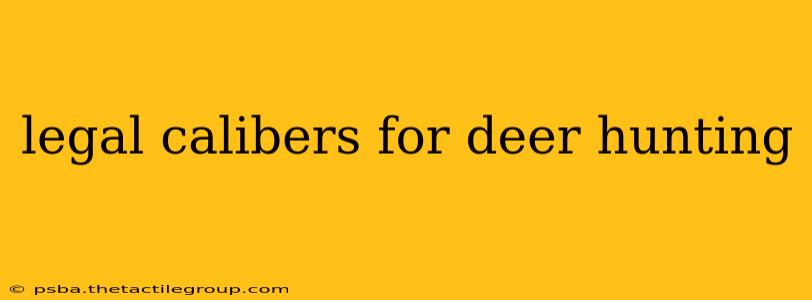Deer hunting is a cherished tradition for many, demanding careful consideration of various factors, including the choice of firearm caliber. Selecting the right caliber is crucial for ethical and successful hunting, ensuring a clean kill and respecting the animal. This guide provides a comprehensive overview of legal calibers for deer hunting across various jurisdictions, along with crucial factors to consider when making your choice.
Understanding Legal Restrictions
Before discussing specific calibers, it's vital to understand that legal hunting calibers vary significantly by state, province, or territory. Regulations often specify minimum caliber requirements, bullet weight, and even bullet type (e.g., expanding vs. full metal jacket). Always check your local hunting regulations before selecting a firearm and ammunition. These regulations are usually available online through your state's wildlife agency or department of natural resources. Failure to comply with these laws can result in hefty fines and the revocation of hunting privileges.
Factors to Consider Beyond Legality
While legality is paramount, several other factors influence the best caliber choice for deer hunting:
1. Range and Shot Placement:
- Effective Range: Different calibers have varying effective ranges. A longer-range caliber allows for shots at greater distances, but requires superior marksmanship. Shorter-range calibers are better suited for closer encounters.
- Accuracy: Accuracy is crucial for ethical hunting. A precise shot placement is essential for a quick and humane kill. Choose a caliber you can shoot accurately and consistently.
2. Energy Transfer:
- Bullet Energy: The energy a bullet delivers upon impact determines its ability to kill effectively. Higher energy calibers generally offer better penetration and expansion, leading to a quicker, more humane kill. However, excessive energy can lead to excessive damage.
3. Recoil:
- Manageability: High-recoil calibers can be difficult to handle, especially for less experienced hunters. Consider your physical capabilities and experience level when choosing a caliber.
Commonly Used Legal Calibers (Note: Always check local regulations)
Many calibers are commonly used for deer hunting, and their legality often depends on local regulations. Here are a few examples, categorized for clarity:
Popular Centerfire Calibers:
- .243 Winchester: A popular choice for its accuracy, manageable recoil, and relatively flat trajectory.
- .270 Winchester: A versatile and powerful cartridge suitable for various deer sizes and ranges.
- .30-06 Springfield: A classic and powerful cartridge known for its stopping power and long range.
- .308 Winchester: A popular choice for its balance of power, accuracy, and manageable recoil. Often chosen for its widespread availability.
- 7mm Remington Magnum: A powerful cartridge offering a flat trajectory and excellent range. Often a preferred choice for larger deer.
- .300 Winchester Magnum: A highly powerful cartridge often used for longer-range shots on larger deer. Recoil is substantial.
Popular Straight-Walled Calibers (for states permitting):
- .44 Magnum: Powerful handgun round, legal in some areas for deer hunting, but requires careful shot placement.
- .45-70 Government: A historically significant cartridge, legal in select locations, known for substantial power and stopping power.
Conclusion: Research and Responsibility
Selecting the appropriate caliber for deer hunting is a crucial decision involving legal compliance, ethical considerations, and personal proficiency. Always prioritize safety, accuracy, and responsible hunting practices. Before embarking on your hunt, thoroughly research your local hunting regulations and consider your hunting style and skill level. Remember, the choice of caliber is a crucial part of ethical and successful deer hunting. Contact your local wildlife agency for definitive answers regarding legal calibers in your area.

